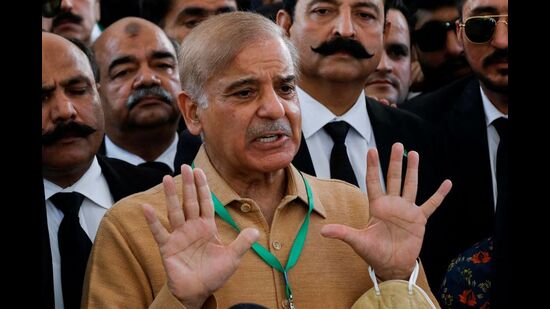India must rehaul its Pakistan policy
New Delhi must rethink and reboot its strategies across the crucial economic, strategic, and diplomatic sectors
The regime change in India’s neighbourhood, with inevitable regional repercussions, is characterised by elements of continuity and change. Change in terms of regime, but Pakistani continuity in terms of foreign policy, vis-a-vis India and China.

Soon after installation, new Prime Minister (PM) Shehbaz Sharif brought up Kashmir. “We want good relations with India but a durable peace can’t be possible without Kashmir’s solution,” he said. The Chinese press began humming odes to the PM and the Chinese Communist Party’s mouthpiece, Global Times, claimed that bilateral relations between the two countries “could be even better than under [Imran] Khan”.
The challenge could be tougher for India, as Sharif is less wishy-washy, weak-kneed, and whimsical than Khan. Sharif also brings his long political experience as a three-term chief minister, equipping himself with every quality of a notorious neta.
India must rethink and reboot its Pakistan policy dynamically — economic, strategic, and diplomatic. Economically, India should ensure a quick stop to Pakistan’s continuing exploitation of preferential trade benefits from the world. First, Pakistan reaps massive trade and tax benefits through the European Union’s Scheme of Preferences (GSP+), which has accelerated its exports to Europe to €7.492 billion in 2019 from €4.538 billion in 2013 — a mammoth 65% increase. Though this is reviewable for human rights violations by the host country, India has been unable to leverage Pakistan’s established status as a global exporter of terrorism to deny these non-terror export benefits to Pakistan. Second, India should redouble efforts to ensure that Pakistan remains on the Financial Action Task Force (FATF) Grey List, if not blacklisted sooner. Pakistan is in deep economic pain and the conviction of terrorist Hafiz Saeed is nothing more than optics to circumvent FATF and fool its members.
Third, India should engage much more aggressively with the Gulf nations, the United States (US) and International Monetary Fund (all entities where Pakistan goes with a begging bowl for aid and bailouts), to minimise such doles. Fourth, Pakistan’s Inter-Services Intelligence is the only spy agency in the world that does humongous illicit trade. It controls nearly 90% of the global heroin trade from the opium grown by the Taliban. A weak Pakistan government with a borderline majority creates a conducive environment for India to give a decisive blow to this clandestine market and show off its six-pack abs as the Big Brother of South Asia.
On the strategic front, India has anomalously been out to lunch when it comes to the sufferings of dissident communities in Pakistan fighting for liberty and liberation. Pashtun youth icons such as Manzoor Pashteen, Mohsin Dawar and the Pashtun Tahaffuz Movement have given sleepless nights to the Pakistani establishment, but remain largely unassisted. The impressive resistance by the Balochs also cannot be ignored. Similarly, the Sindhis are a hugely prosperous community with a powerful overseas movement speaking up against Pakistani human rights violations. India should have a separate strategy for every dissident group, based on their strengths and should extend all support to overseas Sindhis, empower Pashtuns and equip Balochs.
India should read out — loud and clear — that bilateral negotiations, unifocally meaning Kashmir for Pakistan, must include Pakistan-occupied Kashmir and Gilgit-Baltistan issues and that otherwise talks cannot begin. A regime change in Pakistan means a direct change in command-and-control of the Taliban. Anticipating turning tides in the country, India should push for a collective decision-making for Afghanistan and try to re-establish itself as the regional leader through initiatives such as the Regional Security Dialogue on Afghanistan, which was hosted by Delhi last year while strengthening its engagements with all Afghan stakeholders.
Diplomatically, Khan’s desire to create an anti-Saudi alliance in the Ummah along with Turkey-Malaysia-Qatar has pushed the Saudi-led block closer to India. Not due to the smartness of the Indian government, but due to Pakistan’s foreign policy blunders, the stage is already set to cut Pakistan loose entirely from the Saudi-led alliance. India now needs to follow the principle of carpe diem i.e. make most of the present without agonising about the future.
India must also reclaim its regional leadership in a more institutionalised manner by revamping, relaunching, and rejuvenating the Bay of Bengal Initiative for Multi-Sectoral Technical and Economic Cooperation, and establish it as a strong alternative to the South Asian Association for Regional Cooperation, marginalising Pakistan.
As a nation with the world’s second or third-largest Muslim population, India should push for entry into the Organisation for Islamic Cooperation (OIC), become a leader among Muslim nations and let Pakistan look like a lame duck and pretender.
We have always advocated for a strong Quad since inception. Philia Forum — an initiative of France, Greece, Cyprus, and Saudi — could prove as mighty as Quad in countering Pakistan in an altogether different region. Members of this forum have repeatedly expressed their desire to have India in the forum: The latter’s reticence is mystifying. India will lose nothing by joining, except hesitant diplomacy.
In conclusion, remember Henry Kissinger’s words, “A country that demands moral perfection in its foreign policy will achieve neither perfection nor security.” Forget Kissinger as an India hater and adopt his realpolitik. Richard Lugar rightly said, “There are no shortcuts to victory. We must commit ourselves to the slow, painstaking work of foreign policy day by day and year by year.” The objectives must be and must always remain clear.
Abhishek Singhvi is a senior three-term sitting MP; former chairman, parliamentary standing committee; former additional solicitor-general; senior national spokesperson, Congress and senior advocate. Akash Kumar Singh is a PhD scholar at Jawaharlal Nehru University
The views expressed are personal
Continue reading with HT Premium Subscription




